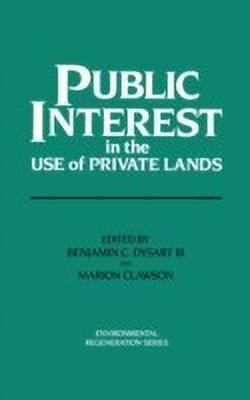Public Interest in the Use of Private Lands(English, Hardcover, unknown)
Quick Overview
Product Price Comparison
This third volume in the Environmental Regeneration Series, sponsored by the Rene Dubos Center, brings together original work by distinguished scholars and policy makers on the management of the nation's land resources. As the editors note at the outset, almost all questions of environmental quality or resource use ultimately focus upon the land. And, they argue, because most food and energy production, toxic waste storage, resource use, and other activities take place on privately owned land, socially responsible resource-related tradeoffs and good stewardship are at least as important for our private lands as for our public lands. In their examination of the bases for public interest and control of privately owned lands, the contributors consider the rights and obligations of the private owner, the different natural resource situations, regional variations, and the sometimes conflicting goals of different interest groups. The contributors pay particular attention to interrelationships in land use, the linkages among all the components of resource systems, and the necessity of expanding system boundary definitions beyond traditional, technically-oriented definitions. Among the specific issues addressed are maintaining agricultural productivity, siting concerns, cross-media environmental problems, and multiple use considerations. Individual chapters are devoted to such topics as effective toxics management, biotechnology, acid rain, waste management, the location of industrial facilities, and nuclear waste packaging. Taken together, these essays will provide students of land management and policy makers in local and national government with a better understanding of the complex issues involved--an understanding that should lead to better informed decision making about the responsible use of our nation's private lands.


